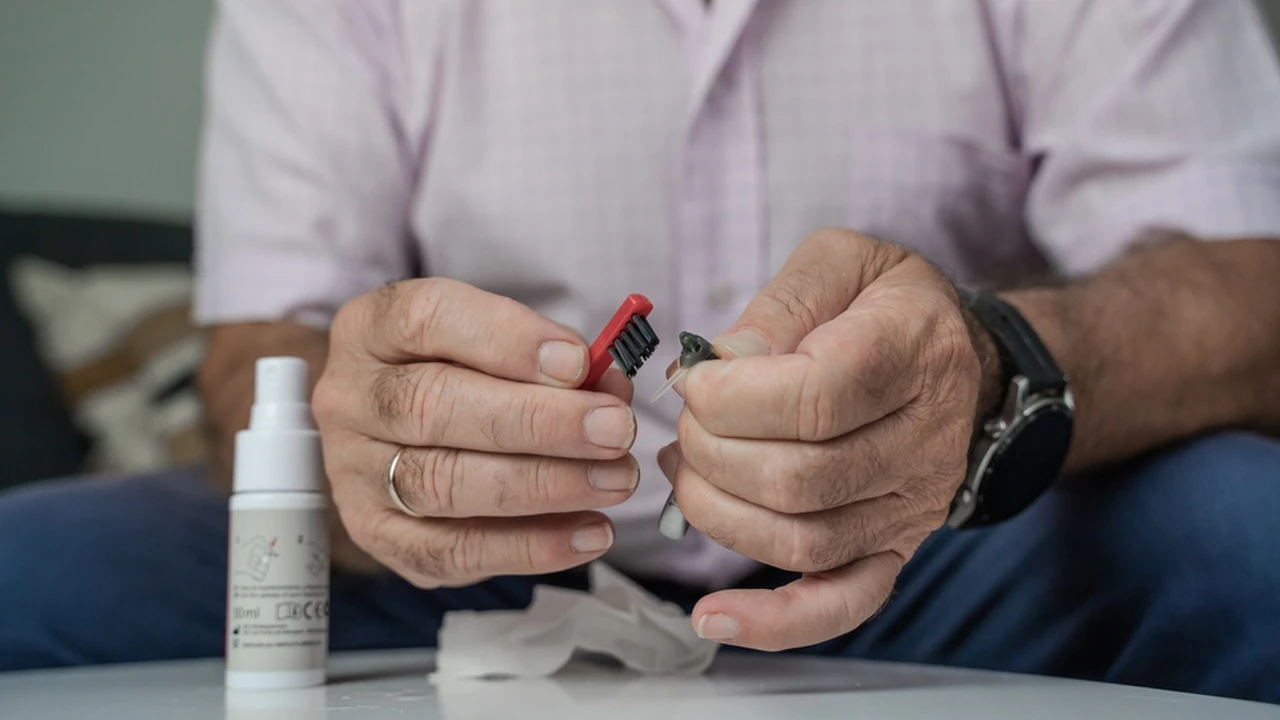Best Hearing Aids For Active Lifestyles 2024
Explore the 4 best hearing aids tailored for musicians. Learn about their sound processing, feedback control, and ability to preserve sound fidelity.

Reviewing The 4 Best Hearing Aids For Musicians
Hey there, fellow music lovers and hearing aid users! If you're a musician, whether professional or amateur, you know how crucial sound quality is. You also know that hearing loss can be a real bummer, especially when it comes to enjoying and creating music. But here's the good news: modern hearing aids aren't just about making speech clearer; they're increasingly designed with features that can truly enhance your musical experience. We're talking about devices that can handle the dynamic range of live performances, preserve the richness of instruments, and minimize feedback, all while helping you hear better in everyday life. It's a game-changer!
For musicians, the stakes are a bit higher when it comes to choosing a hearing aid. You're not just looking for amplification; you need fidelity, clarity, and the ability to distinguish between complex sounds. You want to hear every nuance of a guitar solo, every subtle shift in a symphony, and every beat of a drum. Standard hearing aids, while excellent for speech, might sometimes compress sounds in a way that flattens music, or they might struggle with the high volumes and varied frequencies found in musical environments. That's why some manufacturers have really stepped up their game, developing specific programs and technologies to cater to the unique needs of musicians. So, let's dive into some of the best options out there that are hitting all the right notes for musicians.
Understanding Musicians Hearing Aid Needs Sound Fidelity and Dynamic Range
Before we jump into specific models, let's quickly chat about what makes a hearing aid 'good' for a musician. It's not just about making things louder. For music, you need a hearing aid that can handle a wide dynamic range without distortion. This means it can process both very soft and very loud sounds accurately, which is essential for instruments like drums or a full orchestra. Many standard hearing aids use aggressive compression to make speech more comfortable, but this can make music sound 'flat' or 'squashed.' Musicians need less compression, especially in their music programs.
Another key factor is sound fidelity. You want the hearing aid to reproduce sounds as naturally as possible, preserving the timbre and harmonics of instruments. This often means a wider frequency response and less aggressive noise reduction in music programs, as some 'noise' in music (like reverb or subtle background instruments) is actually part of the experience. Feedback suppression is also super important, especially for vocalists or those playing amplified instruments, as you don't want annoying whistling interrupting your performance or practice. Lastly, connectivity features like Bluetooth streaming are a huge plus, allowing musicians to stream music directly from their devices or even connect to mixing boards.
Top Pick 1 Phonak Audéo Lumity For Musicians Advanced Sound Processing
First up, let's talk about the Phonak Audéo Lumity. Phonak has a long-standing reputation for innovation, and their Lumity platform is particularly impressive for musicians. What makes it stand out? It's largely due to their 'AutoSense OS 5.0' operating system, which is incredibly adept at identifying different sound environments and automatically adjusting. For musicians, this means it can often recognize a 'music' environment and switch to a more appropriate program with less compression and a wider dynamic range.
Key Features of Phonak Audéo Lumity for Music
- AutoSense OS 5.0: This intelligent system automatically blends programs to optimize sound for various environments, including dedicated music settings. It's designed to provide a richer, fuller sound experience for music.
- StereoZoom 2.0 and SpeechSensor: While primarily for speech, these features can help musicians focus on specific sounds within a complex musical arrangement, like a lead instrument or a vocalist, without losing the overall context.
- Universal Bluetooth Connectivity: This is a huge win for musicians. You can stream high-quality audio directly from virtually any Bluetooth-enabled device – your phone, tablet, or even a digital mixing board (with the right accessories). This is fantastic for practicing with backing tracks or monitoring your own performance.
- Rechargeable Options: The Audéo Lumity comes in rechargeable models, offering a full day of hearing with a single charge, which is super convenient for long practice sessions or gigs.
- MyPhonak App: The app allows for personalized adjustments, including fine-tuning music programs, adjusting volume, and even creating custom programs for specific musical scenarios.
Real-World Application for Musicians
Imagine you're a guitarist practicing with a band. The Lumity can automatically switch to a music program that allows you to hear your own instrument clearly, along with the bass and drums, without everything sounding muddy. If you're a vocalist, the feedback suppression is excellent, helping to prevent those annoying squeals when you're near a microphone. For classical musicians, the ability to preserve the dynamic range means you can appreciate the subtle crescendos and decrescendos of an orchestra. The direct streaming is also invaluable for listening to reference tracks or learning new pieces.
Pricing and Availability
Phonak Audéo Lumity models typically range from $2,500 to $7,000 per pair, depending on the technology level and provider. They are widely available through audiologists and hearing care professionals globally, including in the US and Southeast Asia. It's always recommended to get a professional fitting to ensure optimal performance, especially for musicians.
Top Pick 2 Oticon More For Natural Soundscapes and Music
Next up, we have the Oticon More. Oticon has taken a unique approach with their 'MoreSound Intelligence' and 'Deep Neural Network' (DNN) technology. Instead of focusing on isolating speech, the More is designed to give you access to a more complete soundscape, which is incredibly beneficial for music. It processes sounds 500 times per second, providing a rich, detailed, and balanced sound environment.
Key Features of Oticon More for Music
- MoreSound Intelligence 2.0 with DNN: This groundbreaking technology processes sounds based on a vast database of real-life soundscapes. For music, this means it can better understand and present the complexities of musical sounds, allowing for a more natural and immersive listening experience. It aims to give you 'more' of the sound environment, rather than filtering it out.
- OpenSound Navigator: While it helps with speech in noise, its underlying principle of preserving the soundscape is excellent for music. It reduces noise without suppressing the important musical elements.
- Music Program: Oticon More offers a dedicated music program that minimizes compression and expands the dynamic range, specifically tailored to make music sound richer and more natural.
- Direct Streaming: Similar to Phonak, Oticon More offers direct streaming from iPhone and select Android devices, allowing for high-quality audio playback of music, practice tracks, or even virtual lessons.
- Rechargeable Options: The More is available in rechargeable miniRITE R styles, providing convenience and reliability for musicians on the go.
Real-World Application for Musicians
If you're a classical musician, the Oticon More's ability to present a full soundscape means you can hear the subtle interplay between different sections of an orchestra, or the rich harmonics of a string quartet. For jazz musicians, the nuanced processing allows you to appreciate the improvisation and intricate rhythms. The dedicated music program ensures that your favorite songs sound vibrant and true to their original recording. It's like having a high-fidelity sound system directly in your ears.
Pricing and Availability
Oticon More hearing aids typically range from $2,000 to $6,500 per pair, depending on the technology level and the provider. They are widely available through authorized Oticon dealers and audiologists in the US, Southeast Asia, and other regions. A professional fitting is crucial to unlock the full potential of these advanced devices.
Top Pick 3 Widex Moment For Pure Sound and Minimal Delay
The Widex Moment is another fantastic option, particularly known for its 'PureSound' technology. Widex has always prided itself on delivering a very natural sound, and the Moment takes this a step further by addressing a common issue in hearing aids: processing delay. This delay, even if milliseconds, can make amplified sound seem artificial or out of sync with direct sound, which is particularly noticeable and irritating for musicians.
Key Features of Widex Moment for Music
- PureSound with ZeroDelay Technology: This is the star feature. By significantly reducing the processing delay to less than 0.5 milliseconds, PureSound virtually eliminates the artificial sound often associated with hearing aids. For musicians, this means a much more natural and 'in-the-moment' listening experience, especially for acoustic instruments or live performances.
- True-Input Technology: This feature ensures that the hearing aid can handle high input levels without distortion, which is absolutely essential for loud musical environments like concerts or band practice.
- Dedicated Music Program: Widex Moment includes a specific music program designed to provide a wide dynamic range and minimal compression, allowing music to sound rich, full, and undistorted.
- SoundSense Learn: This AI-powered feature in the Widex Moment app allows users to personalize their sound experience by comparing different sound profiles, which can be incredibly useful for fine-tuning music settings to your exact preferences.
- Direct Streaming: The Moment offers direct streaming from iOS devices and Android devices (via a COM-DEX accessory), providing clear audio for practice or enjoyment.
Real-World Application for Musicians
If you're a pianist, the PureSound technology means you'll hear the keys strike and the notes resonate with incredible clarity and naturalness, without any distracting delay. For drummers or percussionists, the True-Input technology ensures that even the loudest hits are processed without distortion. The ability to fine-tune your sound with SoundSense Learn means you can create a personalized music profile that perfectly suits your genre or instrument. It's all about experiencing music as it's meant to be heard.
Pricing and Availability
Widex Moment hearing aids typically range from $2,200 to $6,800 per pair, depending on the technology level and the provider. They are available through authorized Widex dealers and hearing care professionals. The unique PureSound technology makes them a strong contender for musicians prioritizing natural sound.
Top Pick 4 Starkey Evolv AI For Personalized Sound and Connectivity
Last but not least, let's consider the Starkey Evolv AI. Starkey has been a leader in integrating artificial intelligence into their hearing aids, and the Evolv AI platform offers some compelling features for musicians, particularly those who value personalization and seamless connectivity.
Key Features of Starkey Evolv AI for Music
- Edge Mode: This on-demand AI feature allows users to instantly optimize sound in challenging listening environments, including complex musical settings. It analyzes the environment and makes real-time adjustments for clarity and comfort.
- Thrive Hearing Control App: The app is a powerhouse for personalization. It allows users to create custom memories (programs) for specific musical situations, adjust sound settings, and even stream audio directly.
- Superior Sound Quality: Starkey emphasizes a natural and clear sound experience. While not specifically 'ZeroDelay' like Widex, the Evolv AI's processing is designed to deliver high-fidelity audio across various soundscapes, including music.
- Direct Streaming and Bluetooth: The Evolv AI offers excellent direct streaming capabilities for both iOS and Android devices, making it easy to stream music, practice tracks, or connect to other audio sources.
- Rechargeable Options: Available in various rechargeable styles, providing convenience and long-lasting power for musicians.
- Fall Detection and Translation: While not directly music-related, these AI features highlight the advanced capabilities of the Evolv AI, offering additional peace of mind and utility.
Real-World Application for Musicians
If you're a DJ, the Evolv AI's robust streaming and personalized programs can be incredibly useful for monitoring your mix and hearing audience reactions. For band members, the Edge Mode can help you quickly adapt to different venue acoustics, ensuring you hear your bandmates and your own instrument clearly. The ability to create custom programs within the Thrive app means you can have a specific setting for your home studio, another for live gigs, and another for just enjoying your favorite albums. It's about having intelligent control over your sound.
Pricing and Availability
Starkey Evolv AI hearing aids typically range from $2,300 to $7,200 per pair, depending on the technology level and provider. They are available through authorized Starkey dealers and audiologists. The AI-driven personalization makes them a strong choice for musicians who want a highly adaptable and connected hearing experience.
Comparing the Best Hearing Aids for Musicians Key Differences
So, how do these top contenders stack up against each other for musicians? It really boils down to what you prioritize:
- Phonak Audéo Lumity: Excellent all-rounder with highly intelligent automatic sound processing (AutoSense OS 5.0) that adapts well to music. Great for musicians who want a 'set it and forget it' experience with reliable music programs and universal Bluetooth.
- Oticon More: Focuses on providing a rich, open soundscape with its Deep Neural Network. Ideal for musicians who want to hear the full complexity and naturalness of music without excessive filtering, offering a more immersive experience.
- Widex Moment: Stands out with its PureSound ZeroDelay technology, offering the most natural and distortion-free sound, especially for acoustic instruments and live performances. Best for musicians who are highly sensitive to processing delays and prioritize absolute sound fidelity.
- Starkey Evolv AI: Leverages artificial intelligence for highly personalized sound and robust connectivity. Great for musicians who want advanced customization through an app, on-demand sound optimization (Edge Mode), and seamless streaming.
All four offer dedicated music programs and excellent streaming capabilities, which are non-negotiable for musicians. The choice often comes down to subtle differences in sound processing philosophy and specific features that resonate most with your personal musical needs and preferences.
Tips for Musicians Choosing Hearing Aids Maximizing Your Musical Experience
Choosing the right hearing aid as a musician is a big decision. Here are a few extra tips to help you make the best choice and get the most out of your devices:
- Work with an Audiologist Who Understands Musicians: This is paramount! Find an audiologist who has experience working with musicians or at least understands the unique demands of musical environments. They can program your hearing aids specifically for music and advise on appropriate accessories.
- Always Ask for a Music Program: Ensure your audiologist activates and fine-tunes a dedicated music program. This program should typically have less compression, a wider dynamic range, and potentially less aggressive noise reduction than your speech programs.
- Test in Real-World Musical Environments: During your trial period, don't just test them in the clinic. Take them to your practice space, a live gig (if possible), or listen to your favorite music at home. Pay attention to how instruments sound, the clarity of vocals, and the overall dynamic range.
- Consider Custom Earmolds: For many musicians, custom earmolds can significantly improve sound quality, comfort, and feedback control. They provide a better seal and can enhance the listening experience.
- Explore Accessories: Look into accessories like remote microphones (for rehearsals or performances), direct audio input cables (for connecting to mixing boards), or streamers that can enhance your musical experience.
- Protect Your Remaining Hearing: Even with hearing aids, continue to protect your hearing. Use custom earplugs when performing or attending loud concerts. Your hearing aids help you hear better, but they don't prevent further damage.
- Be Patient with Adaptation: It takes time to adjust to new hearing aids, especially for music. Your brain needs to re-learn how to process sounds. Give yourself a few weeks or even months to fully adapt.
Ultimately, the best hearing aid for you will be the one that allows you to fully engage with and enjoy music again, whether you're performing, practicing, or simply listening. Don't settle for anything less than a rich, clear, and natural musical experience. Happy listening, and keep making beautiful music!
:max_bytes(150000):strip_icc()/277019-baked-pork-chops-with-cream-of-mushroom-soup-DDMFS-beauty-4x3-BG-7505-5762b731cf30447d9cbbbbbf387beafa.jpg)






